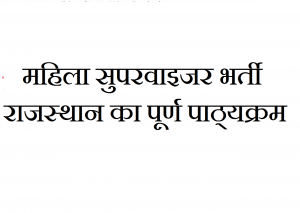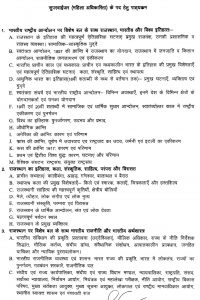RSMSSB Women Supervisor Syllabus Rajasthan
RSMSSB Women Supervisor Syllabus Rajasthan – Rajasthan Subordinate and Ministerial Services Selection Board recently issue a notification for recruitment of women supervisor. Probably exam will be held in July 2018. Selection of candidate will be based on the written exam. Minimum passing marks in this examination will be 40%.
Note: – Negative marking is applicable. For every wrong answer one-third of the mark prescribed shall be deducted

Details of RSMSSB women supervisor vacancy
Details of RSMSSB Women Supervisor Syllabus Rajasthan
| Subject | No. of Question | Total marks |
| Rajasthan Indian and World History with special emphasis on Indian National Movement. | 15 | 30 |
| History, Art, Culture, Literature, Tradition and Heritage of Rajasthan. | 25 | 50 |
| Indian Polity, Indian Economics with special emphasis on Rajasthan | 20 | 40 |
| Use of computers and information technology | 15 | 30 |
| Geography of Rajasthan, India and World | 20 | 40 |
| General Science | 20 | 40 |
| Logical reasoning, mental ability and basic numeracy | 15 | 30 |
| Language ability test: Hindi, English | 20 | 40 |
| Total | 150 | 300 |
Details Syllabus of women supervisor topic wise in Hindi
Note – Click on image for read



LDC/Junior Assistant previous year papers
Details Syllabus of women supervisor topic wise in english
1. Rajasthan, Indian and World History with special emphasis on Indian National Movement:
- Major Landmarks in the History of Rajasthan, Major Dynasties, their Administrative and Revenue System. Socio-cultural Issues.
- Freedom Movement, Role of Rajasthan in the revolt of 1857, Tribal and Peasants movements in Rajasthan, Freedom Struggle in Rajasthan with special reference to Praja MandaI Movements, Political Awakening and Integration.
- Indian History Ancient & Medieval Period: Salient features and Major Landmarks of Ancient and Medieval India. Art, Culture, Literature and Architecture.
- Modem Period: Modem Indian history (from about the middle of the eighteenth century until the present) – significant events, personalities and issues.
- The Freedom Struggle & Indian National Movement- its various stages and important contributors and contributions from different parts of the country.
- Social and Religious Reform movements in the 19th and 20th century. Post-independence consolidation and reorganization within the country.
- Renaissance- Causes and Impact.
- Industrial Revolution.
- American War of Independence- Causes and effects.
- French Revolution, Growth of Nationalism and Liberalism in Europe- Rise of national states- Unification of Italy and Germany.
- Russian Revolution of 1917- Causes and significance.
- First and Second World Wars- Causes, important events and impact.
- World organization- League of Nations and U.N.O.
2. History, Art, Culture, Literature, Tradition and Heritage of Rajasthan
- Ancient Civilization- Kalibanga, Ahar, Bagore, Ganeshwar, Balathal and Bairath.
- Salient features of Architecture – Forts and Monuments, Arts, Paintings and Handicrafts.
- Important Works of Rajasthani literature, Local Dialects.
- Fairs, Festivals, Folk Music and Folk Dances.
- Rajsathani Culture, Traditions and Heritage.
- Religious Movements, Saints & Lok devtas of Rajasthan.
- Important Tourist Places.
- Leading Personalities of Rajasthan.
3. Indian Polity and Indian Economics with special emphasis on Rajasthan
- Indian Constitution, Nature of Indian Constitution; Preamble, Fundamental Rights, Directive Principles of State, Fundamental Duties, Federal Structure, Constitutional Amendments, Emergency Provisions, Public Interest Litigation (P.LL.) and Judicial Review.
- Indian Political System and Governance: Nature of Indian State, Democracy in India,
Reorganization of States, Coalition Governments, Political Parties. - Union and State Executive; Union and State Legislative, Judiciary President, Parliament,
Supreme Court, Election Commission, Comptroller and Auditor General, Planning Commission, National Development Council, Central Vigilance Commission (evC),Central Information Commission, Lokpal, National Human Rights Commission (NHRC). Local Self Government & Panchayati Raj. - Political and Administrative System of Rajasthan Governor, Chief Minister, StateAssembly, High Court, Rajasthan Public Service Commission, District Administration, State Human Rights Commission, Lokayukt, State Election Commission, State Information Commission. Public Policy, Legal Rights and Citizen Charter.
- Economic Concepts and Indian Economy: Basic Concepts of Economics, Basic Knowledge of Budgeting, Banking, Public Finance, National Income.
- Major Sectors of Economy- Agriculture, Industry, Service and Trade- Current Status,Issues & initiatives.
- Major Economic Problems and Government Initiatives, Economic Reforms and Liberalization Human Resource and Economic Development
- Flagship Schemes, Social Justice and Empowerment:- Provisions for Weaker Sections.
- Economy of Rajasthan: Major Agricultural, Industrial and Service Sector Issues. Growth,Development and Planning.
- Infrastructure & Resources, Major Development Projects.
- Flagship Schemes and Programmes- Government Welfare Schemes for SC/ST/Backward Class/MinoritieslDisabled Persons, Destitute, Women, Children, Old Age People
4. Use of Computers and Information Technology:
- Basics of Computer: Introduction to computer- Characteristics, use and types of
computers. - Computer generations and computer architecture: Hardware, input and output devices.
- Information and Communication Technology, Space Technology including Satellites.
- Development of Science and Technology in Rajasthan.
5. Geography of Rajasthan, India and World:
- Geography of World: Broad Physical features, Environmental and Ecological Issues,
Wildlife and Bio-diversity. - Geography of India: Broad physical features and Major physiographic divisions.
- Agriculture, Horticulture, Forestry and Animal Husbandry with special reference to Rajasthan.
- Minerals – Iron, Manganese, Coal, Oil & Gas, Atomic minerals.
- Major Industries and Industrial development.
- Transportation- major transport corridors.
- Natural Resources, Environmental Problems and Ecological Issues.
- Geography of Rajasthan Broad physical features and Major physiographic divisions.
- Natural Resource of Rajasthan.
- Climate, Natural Vegetation, Forests, Wildlife and Bio-diversity.
- Major irrigation projects.
- Mines and Minerals.
- Population.
- Major Industries and Potential for Industrial Development
6. General Science:
- Basics of Everyday Science.
- Human body, Food and Nutrition, Health care
- Physical and Chemical Changes, Metals, Non-Metals and their important compounds,some important compounds used in daily life
- Human Brain, Hormones, Human disease- Causes and cures
- Preliminary Knowledge of digestive and excretory system in human
- Types of vitamins and its deficiency diseases.
- Composition of Blood, Blood Groups
- Use of Biotechnology in the field of Medicine and Agriculture
7. Logical Reasoning, mental ability and basic numeracy:
- Reasoning (Deductive, Inductive, Abductive), Statement and Assumptions, Statement
and Argument, Statements and Conclusion, Courses of Action. - Mental Ability: Number series, Letter series, Odd man out, Coding-Decoding, Problems relating to Relations, Shapes and their sub sections.
- Basic Numeracy: Elementary knowledge of Mathematical and Statistical Analysis.Number System, Order of Magnitude, Ratio and Proportion, Percentage, Simple and Compound Interest
8. Language ability test: Hindi and English
- Tenses/Sequence of Tenses, Voice: Active and Passive,
- Narration: Direct and Indirect, Transformation of Sentences: Assertive to Negative, Interrogative, Exclamatory and vice-versa, Use of Articles and Determiners.
- Use of prepositions, Translation of simple sentence from Hindi to English and vice versa.
- Correction of Sentences Including Subject
- Verb Agreement, Degrees of Adjectives, Connectives and words wrongly used.
- Glossary of official, Technical Terms (with their Hindi versions),
- Synonyms, Antonyms, One word substitution, Forming new words by using prefixes and suffixes